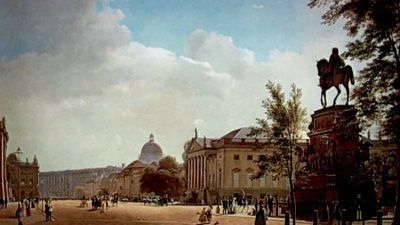

Berlin
Season 1
TV-MA
Berlin is a 2009 documentary series co-developed by the BBC and the Open University. Written and presented by Matt Frei, the series has three 60-minute episodes, each dealing with a different aspect of the history of Germany's capital city.
Where to Watch Season 1
3 Episodes
- Dangerous Ideas
 E1
E1Episode 1Dangerous IdeasThe story of Berlin is one of a clash of ideas that would shape the modern world. The 18th-century king Frederick the Great was a contradictory character whose legacy would define Berlin as a place of both aggressive militarism and enlightened idealism. He would be embraced as an icon by Hitler and, later, the Communist leaders in East Berlin. But Frederick's liberalism created a city in which new theories of sex and sexuality could flourish, inspiring groundbreaking art. During the Cold War, the street that bore the king's name, Friedrichstrasse, was also brutally divided - and irreconcilable. Only after the Berlin Wall fell in 1989 was King Frederick returned to his desired resting place. The funeral was intended as a laying-to-rest of more than just a body. - Ruined Visions
 E2
E2Episode 2Ruined VisionsThe story of Berlin and its buildings is one of visionary creation and terrible destruction, of human ambition and delusion. From the 19th-century architect Karl Friedrich Schinkel to the Bauhaus pioneers of Modernism and the rebuilding of the city after the fall of the Wall, it is a city that has always looked to the future. Architect Albert Speer had grand plans to transform Berlin into a monumental Nazi capital for Adolf Hitler, and the buildings that remain from his scheme are still haunted by their terrible associations. There is no other city in the world where the morality of the architecture has been so heavily scrutinized. Buildings with Imperial, Nazi and Communist pasts all inspire fierce debates about whether this city should acknowledge or deny its chequered history. - Ich bin ein Berliner
 E3
E3Episode 3Ich bin ein BerlinerThe life and character of Berliners have been defined by a struggle for freedom. In 1963, President Kennedy declared that all free men, wherever they may live, are citizens of Berlin. But centuries earlier, the rulers of the city offered freedom to the oppressed. Jews moved to the city from Vienna and eastern Europe, and were instrumental in creating the city as it now exists. During the Nazi years, however, Berlin's Jews were driven underground, many unable to leave the city they loved. When the Russians arrived at the end of the Second World War, Berlin's women found themselves at the mercy of rapists rather than liberators. Citizens became pawns in a global game through the Berlin blockade, and when the Berlin Wall was built, both East and West held themselves up as beacons of freedom. But only when it fell did Berliners attain the freedom that their early rulers had promised them.